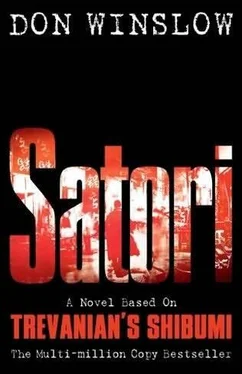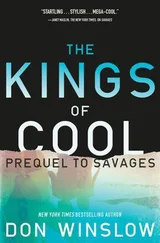Nicholai had never known satori.
In front of the kakemono, on a small wooden stand, was a bowl that held a single small maple branch.
They stepped over to a low table, on which was a charcoal burner and a kettle. As Nicholai and Kamiko knelt on the mat by the table, Haverford bowed and left the room. A few moments later a gong sounded, and he returned carrying the cha-wan, a red ceramic bowl that contained a tea whisk, a tea scoop, and a cloth.
As teishu, the host, Haverford knelt at his proper place at the table, directly across the hearth from Nicholai. He wiped all the utensils with the cloth, then filled the bowl with hot water, rinsed the whisk, then poured the water into a waste bowl and carefully wiped the tea bowl again.
Nicholai found himself enjoying the old ritual, but did not want to be lulled into complacency. The American had obviously done his research and knew that in the few years of freedom Nicholai had enjoyed in Tokyo before his imprisonment, he had established a formal Japanese household, with retainers, and had observed the old rituals. Surely he knew that Nicholai would find the cha-kai both nostalgic and comforting.
And it is both, Nicholai thought, but be cautious.
Haverford presented the tea scoop, then opened a small container and paused to allow his guest to appreciate the aroma. Nicholai realized with surprise that this was koi-cha, from plants one hundred years old, grown only in the shade in certain parts of Kyoto. He could not imagine what this mat-cha might have cost, then wondered what it might eventually cost him, given that the Americans had not gone to such extravagance for nothing.
Pausing for precisely the correct time, Haverford then dipped a small ladle into the container and scooped out six measures of the finely powdered pale green tea into the cha-wan. He used the bamboo ladle to heap hot water into the bowl, then took the whisk and whipped the potion into a thin paste. He examined his work, then, satisfied, passed the bowl across the table to Nicholai.
As ritual demanded, Nicholai bowed, took the cha-wan with his right hand, then passed it to his left, holding it only in the palm of his hand. He turned it clockwise three times and then took a long sip. The tea was superb, and Nicholai politely finished his drink with a loud slurp. Then he wiped the rim of the cha-wan with his right hand, turned it once clockwise, and handed it back to Haverford, who bowed and took a drink.
Now the cha-kai entered a less formal phase, as Haverford wiped the cha-wan again and Kamiko added more charcoal to the hearth in preparation for making cups of thinner tea. Still, there were formalities to observe, and Nicholai in his role as guest began a conversation about the utensils used in the ceremony.
“The cha-wan is Momoyama Period, yes?” he said to Haverford, recognizing the distinct red tincture. “It is beautiful.”
“Momoyama, yes,” Haverford answered, “but not the best example.”
They both knew that the seventeenth-century bowl was rightfully priceless. The American had gone to immense trouble and expense to arrange this “modest” cha-kai, and Nicholai could not help but wonder why.
And the American could not quite contain his satisfaction at pulling off this surprise.
I don’t know you, Hel, Haverford thought as he sank back into his own seiza position, but you don’t know me either.
In fact, Ellis Haverford was something quite different from the Company thugs who had beaten Nicholai to a bloody pulp during three days of brutal interrogation. A native of Manhattan’s Upper East Side, he had spurned Yale and Harvard for Columbia, as he couldn’t imagine anyone choosing to live anywhere but on the isle of Manhattan. He was majoring in Oriental history and languages when Pearl Harbor was bombed, and was therefore a natural to go into an intelligence desk job.
Haverford refused, joined the Marines instead, and commanded a platoon on Guadalcanal and a company in New Guinea. Purple Heart and Navy Cross on his chest, he finally conceded that his education was being wasted, agreed to go into the covert side of the war, and found himself training local resistance movements against the Japanese in the jungles of French Indochina. Haverford was fluent in French, Japanese, and Vietnamese and could make himself understood in some parts of China. As aristocratic in his own way as Hel – although he came from far more money – Ellis Haverford was one of those rare individuals who seemed comfortable in any setting, including an exclusive Japanese teahouse.
Now Kamiko served thin tea and brought out mukozuke, a tray of light snacks – sashimi and pickled vegetables.
“The food is good,” Nicholai said in Japanese as Kamiko served.
“It’s garbage,” Haverford answered, pro forma, “but I’m afraid it’s the best I can offer. I am so sorry.”
“It’s more than enough,” Nicholai said, unconsciously slipping into Japanese manners that he had not had the opportunity to use for years.
“You are more than kind,” Haverford responded.
Aware of Kamiko’s passive attention, Nicholai asked, “Shall we switch languages?”
Haverford already knew that Hel spoke English, French, Russian, German, Chinese, Japanese, and, randomly, Basque – so there was quite a menu from which to choose. He suggested French and Nicholai accepted.
“So,” Nicholai said, “you have offered me one hundred thousand dollars, my liberty, a Costa Rican passport, and the home addresses of Major Diamond and his apprentices in exchange for my performing a service that I assume involves a murder.”
“ ‘Murder’ is an ugly word,” Haverford answered, “but you have the basic elements of the deal correct, yes.”
“Why me?”
“You have certain unique characteristics,” Haverford said, “combined with specific skills required for the assignment.”
“Such as?”
“You don’t need to know that yet.”
“When do I begin?” Nicholai asked.
“More a question of how.”
“Very well. How do I begin?”
“First,” Haverford answered, “we repair your face.”
“You find it unpalatable?” Nicholai asked, aware that his once handsome countenance was indeed a lopsided, swollen and disjointed mess from the fists and truncheons of Major Diamond and his associates.
Nicholai had worked for the Americans as a translator until he had killed Kishikawa-san; then Diamond and his goons had beaten Nicholai before subjecting him to mind-altering, horrifying experiments with psychotropic drugs. The pain had been bad enough, the disfigurement still worse, but what hurt Nicholai even more was the loss of control, the terrible helplessness, the feeling that Diamond and his disgusting little helpers had somehow stolen his very being and played with it the way a twisted and stupid child might have toyed with a captive animal.
I will deal with them in due time, he thought. Diamond, his thugs, the doctor who administered the injections and observed the results on his “patient” with cold-blooded clinical interest – they will all see me again, albeit briefly, and just before they die.
Right now I must come to terms with Haverford, who is essential to achieving my revenge. At least Haverford is interesting – impeccably dressed, obviously well educated, just as obviously a scion of what passes for the aristocracy in America.
“Not at all,” Haverford said. “I just believe that when you damage something, you should repair it. It seems only fair.”
Haverford is trying to tell me, Nicholai thought, in a quite un-American subtle way, that he is not them. But of course you are, the clothes and education are but a patina on the same cracked vessel. He asked, “What if I do not choose to be ‘repaired’?”
Читать дальше












